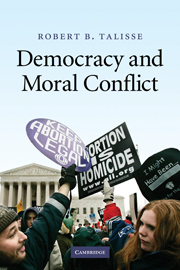4 - Justifying democracy
Published online by Cambridge University Press: 03 December 2009
Summary
It may seem that we have journeyed a great distance from our topic, which, you may remember, is democracy. However, if you will grant the arguments from Chapter 3 to the effect that the characterization I have offered of folk epistemology is accurate and not simply a distillation of our provincial epistemic folkways, then we are well on our way to justifying democracy. The argument of the present chapter is intuitive and can be stated succinctly: only in a democracy can an individual practice proper epistemic agency; put in other words, only in a democracy can one be a proper believer. Since we are already committed to proper believing, we are implicitly committed to democratic politics. Folk epistemology accordingly justifies democracy: democracy is the political entailment – indeed, the political manifestation – of the folk epistemic commitments each of us already endorses.
To be sure, there are many details to be filled in. This is what I shall undertake in the present chapter. It is worth emphasizing that, if my arguments prove to be successful, I will have devised a solution to the problem of deep politics. If folk epistemology justifies democracy, then citizens have a reason to sustain their commitment to democratic political arrangements despite the fact that they are deeply divided at the level of their moral and religious commitments.
FOLK EPISTEMOLOGY AND THE JUSTIFICATION OF DEMOCRACY
The basic argument
I argued in Chapter 3 that believing commits us to certain activities. For example, I argued that the fact that we hold beliefs at all commits us to the norms associated with assertion, and chief among these is the norm of articulating, exchanging, and responding to reasons.
- Type
- Chapter
- Information
- Democracy and Moral Conflict , pp. 121 - 155Publisher: Cambridge University PressPrint publication year: 2009



